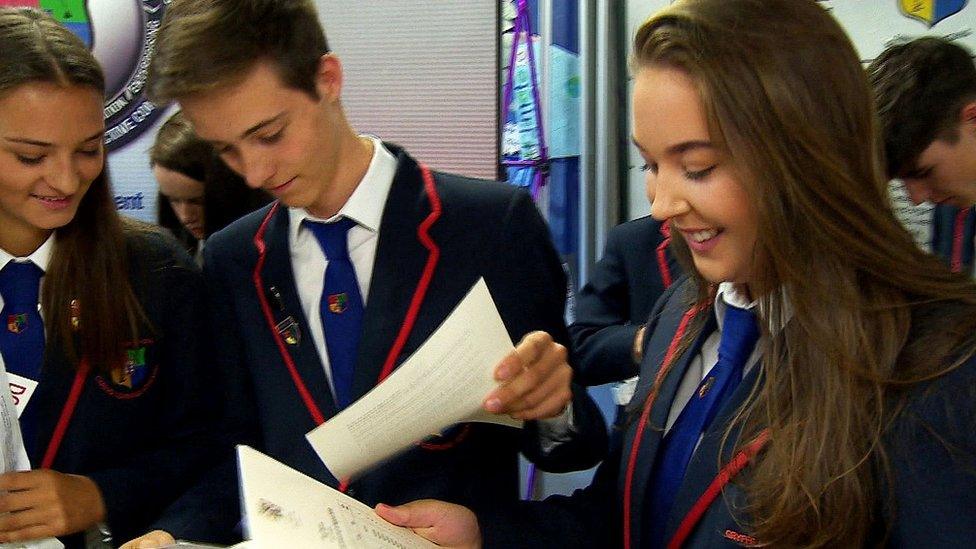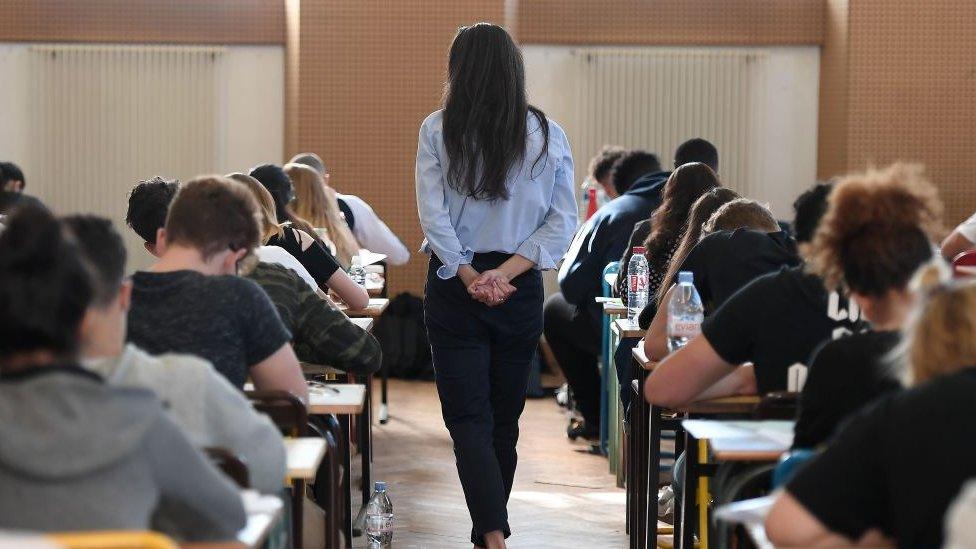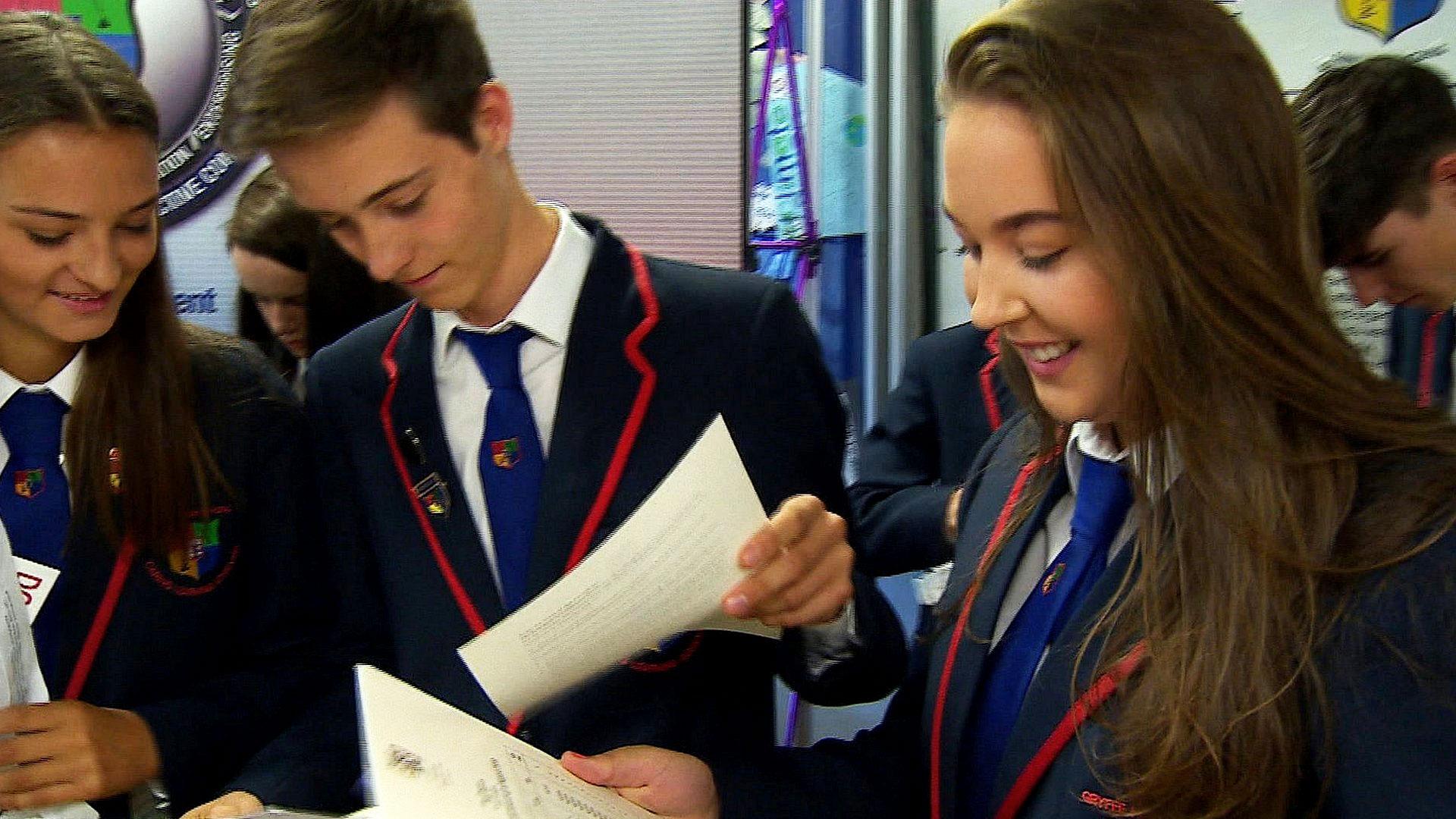Making the grade on results day
- Published

Gryffe High School featured in BBC Scotland coverage
The exam results are a red letter day in the calendar for schools and what might be termed a hardy perennial for journalists and politicians.
Each year the story is a balancing act.
On the one hand, for the candidates it will be a day of celebration or disappointment.
On the other, the data will be pored over by those looking to see whether government policies or initiatives are working or not.
When I say a celebration for candidates, I am not simply referring to those who got straight As or met their conditional offers for university. The focus now is on the whole of the qualifications system and on the achievements of all learners.
This year, our coverage on Reporting Scotland began, for the first time, with an event for young people with experience of the care system to celebrate their results - results achieved in challenging personal circumstances.

Not all coverage is of high-flyers in middle class areas
Indeed for several years now we have tried to ensure the considered coverage later in the day avoids easy stories about middle class children in comfortable areas achieving straight As - even though these youngsters have every right to point out how hard they have worked.
(As someone who faced, shall we say, close parental scrutiny whenever I did not get top marks I have a lot of personal sympathy for youngsters whose parents may always have expected them to get nothing but the best grades. There is nothing more upsetting than hearing of a candidate left in tears because marks which were still excellent by any objective standard were still not good enough to meet a conditional offer from a university - or the expectations of their mum or dad.)
Instead we often feature schools which can discuss the challenges they have faced or how their overall performance has improved.
But while we can use the results as an excuse to look at the underlying story at an individual school, can we use results day to assess trends in the system itself?
There are now three consecutive sets of data on the Highers which went through a shake up which was completed in 2016.
The slight drop in the Higher pass rate over the two years suggests broad stability - stability which opposition politicians may also see as complacency.
Indeed it is important not to jump to instant conclusions from headline statistics.
Were the pass rate to have gone up significantly, no doubt there would be claims that exams were getting easier or that teachers were "teaching to the test".
A significant drop though might lead to accusations of falling standards - or be seen as a sign that exams were getting harder.
Naturally though the detailed subject-by-subject data will be pored over for signs of trends, problems or improvement.

Eastwood High School pupils Clare Wallace (right) and Erin Wallace show head teacher Stuart Maxwell their results
The detailed breakdown of the grades for National 5 English - mostly taken by S4 students - may prove to be of particular interest.
Fewer candidates got an A this year and there are several possible explanations.
It might, for instance, be the case that the exam overall was too tough. However the SQA has a quality assurance scheme to try to make sure exam papers are up to standard. Meanwhile grade boundaries and the pass mark are adjusted each year to try to ensure consistency.
Perhaps it is a sign of the way the new suite of qualifications are settling in. Schools and teachers may be letting some of the more able students bypass their National 5 in S4 so they can spend two years working towards their Higher English with inevitable consequences for the proportion getting an A.
Or, more worryingly, might it suggest declining standards?
It would simply be wrong just now to jump to conclusions or make assumptions. But no doubt policymakers will be looking carefully to find out what may have happened.
There can always be dangers in reading too much about the underlying situation into one year's statistics.
If the drop in A grades in National 5 English were to be followed by a similar trend in Higher English next year it could however set off alarm bells.
Another issue concerns the falling numbers of candidates in some individual subjects.

Pupils at Gryffe High School with their results
Fewer students sat Higher Maths this year although the pass rate rose. Is that a sign that borderline candidates are avoiding maths? Or is it simply a further demonstration that any sense of Higher Maths being, in effect, mandatory for the most able has now gone.
Physics teachers also expressed concern about a drop in the number of Higher candidates.
One issue to investigate might be whether this drop is in any way connected to the problems some councils have had filling vacancies in STEM subjects - science, technology and maths.
The Scottish government is, of course, determined to raise attainment in schools and help disadvantaged children do better.
In practice, much of the effort is going into primary schools and the early years of secondary so any impact on the exam results is more subtle and will become more apparent over time.
So, as ever, scrutiny of the results poses lots of interesting questions but the answers are not necessarily immediate or obvious.
- Published7 August 2018
